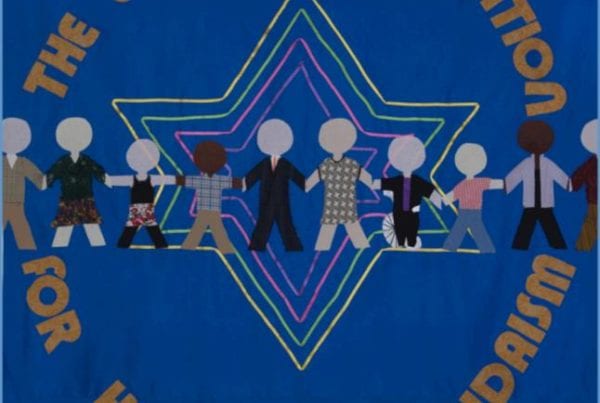Yom Kippur 2010
Forgiveness
by Dan Wyman
“Danny, are you a Nazi?!!!”
This was my grandmother Edith’s response to me when, at age 10 on a visit to her in Germany, I asked for a pair of lederhosen, the traditional leather shorts or ¾ pants with suspenders that you’ve seen in cartoons of oompah bands, but which are still standard wear in Germany when one is feeling patriotic, perhaps not that different from wearing a cowboy hat here in the US.
“Do you know that my parents were sent to the Ovens?!”
Of course I knew her parents had been murdered in the Holocaust, and I knew the family story, of her and my mother’s and my grandfather’s flight from Nazi Germany to Chile in 1939.
Already at age 10, I also knew she had a very short fuse, that she was prone to exaggeration, blow-ups, and hyperbole.
Even knowing her tendencies, the explosion about the lederhosen stunned me and I sobbed. And it made me mad that she would imply that I would side with Nazism against her and our family. And as I went through my 20s and 30s, she was not someone I was anxious to forgive.
Edith’s life story will be familiar to many of you: Born in rural northwestern Germany into a Jewish cattle-dealing family in the early 20th Century, Edith saw herself as part of the new cosmopolitan intellectual urban Germany culture. She married my Grandfather, who came from a comparable urban Bavarian Jewish family. She survived WW I, the great depression, and then the rise of Nazism in Germany, and her and her family’s slow exclusion from social, cultural, and career circles.
On Kristallnacht, the November 1938 pogrom across Germany which targeted Jews and Jewish businesses and institutions, her husband, my grandfather, Emil, was beaten up and held in Dachau for 2 weeks. Not long thereafter, the two of them and my 4-year-old mother, Eva, fled to Chile, where they lived the typically difficult life of stateless refugees who did not speak the local language.
But Edith’s parents never escaped. They were murdered in 1942. And after 30 years in Latin America, Edith returned to Germany—it was still her first love, her homeland, despite all the ghosts and shadows everywhere.
So, by any measure, much of her life was not easy.
But the resentment I held against Edith for most of my adult life was not about Lederhosen. It was about her awful mistreatment of my mother. From as early as I can remember, Edith would tell my mother that she was too fat, that she needed to eat less, that what she was doing with her career was a mistake. That my mother’s friends were silly, that her parenting was all wrong. That my mother was selfish, that my mother loved her father more than my grandmother Edith. The unending criticism, the guilt-inducement, the insistence on a kind of filial piety—all of which I witnessed throughout my childhood. I also learned about Edith’s open affairs, her abandonment of my mother and grandfather.
Every time my grandmother visited, she created crises and my mom ending up crying.
I also developed the sense, right or wrong, that my mother’s depression and anxiety and excessive napping throughout my childhood were primarily because of Edith.
Now, I should also say, in all fairness, that this woman, my grandmother, my Omi, was also a very loving, overindulgent grandmother, who smothered me and my sisters with presents. She was full of typical grandmotherly pride, that anything less than Harvard would not be worthy of our abilities.
I was the apple, the gilded apple of her eye, forever on a pedestal. And there was no one to whom I felt as special.
So, this is the woman who, in 1997, at age 89, was dying of cancer in Germany. And I refused to visit her until she was lying in her plain, pine, Jewish casket. I was angry and I had no interest in forgiving her.
I told my mother that I was not coming while Edith was sick, but that I did want to come to her funeral, that that would be important to me. Hearing myself say these words felt strange, but it felt absolutely right. I felt that it was for my mother’s sake that I didn’t want to forgive Edith.
I’ve reflected over the years on the context for this decision. I was 10 years into my relationship with my wife, Jenny, who had spent most of that decade coming to terms with the awful mothering she had received growing up with her mother in Zambia. It was a different childhood from my mother’s, to be sure. Jenny’s childhood was full of sexual abuse at the hands of her step-father and other men in and outside of his family, and perhaps at the hands of her own mother as well. It was full of a general lack of safety; of not being allowed to live with her father.
My mother survived her childhood; my wife Jenny did not, dying some 8 years after Edith, at age 39, from an autoimmune disease almost certainly related to the trauma she experienced as a child.
But Jenny’s and my mother’s early years also had real similarities, including the constant emotional violence and criticisms of their bodies and the general state of war between their divorced parents.
And though Jenny was very critical of her own mother, her view was tempered by conflicting feelings of love and respect. This was the context, at the time of my grandmother’s impending death, in which I was thinking about relationships between adult children and their “bad” elders.
Jenny refused to see her own mother for several years, and I was going to take the same position with Edith. I was not going to visit. It became a way to take a stand in support of my mother (whether she wanted this kind of support or not), a way to commit what I would later call “proactive disloyalty,” doing what we believe is right rather than what our elders think we should do.
Funerals are often an opportunity to forgive, though. We extol the virtues of the deceased. We generally do not speak ill of the dead, or if we do, we force ourselves to see their flaws and our anger in the context of an entire life full of other positive qualities.
We may decide that we were overly harsh with the other person, or that we had other things happening in our own lives that made us especially angry and offended.
Forgiving, after all, is active, and it involves the other person, or at least our memory or idea of them. Forgiving involves some kind of repairing of the relationship with the person, so that we can find some positive, or at least neutral, place for them in our hearts.
But I did something different when Edith died. I didn’t forgive her. Rather, I let go.
I was active in Alcoholics Anonymous for over 20 years, and the idea of letting go is central to AA philosophy. In the specific context of drinking, letting go involves admitting defeat, the idea that I can’t fight alcohol and win, so I let go, I refuse to get in the ring with alcohol, I give up, I let go of worrying about whether I can drink safely or not. I can’t, so I let go of even worrying about it.
In dealing with personal relationships, especially resentments, AA just as strongly pushes the idea of letting go as a kind of “acceptance.” Don’t hold onto anger, accept how the person is, and let go of the resentment, even of the person. There are, famously, other parts of AA which focus on mending relationships with people who we ourselves have wronged, but in dealing with people who we feel have wronged us, letting go is key.
Forgiving involves a mending of sorts, where letting go focuses on not letting the resentment or the person continue to bother us, not letting them “take up real estate in our heads,” as you will hear around AA tables.
Letting go does doesn’t require us to understand the offending person. Understanding is not the goal. Rather the point is my deciding what I want to focus on and be angry about and what I don’t. It is focused on my own happiness rather than on repairing the relationship with the other person. There is a kind of throwing up one’s hands, of literally saying, as we do in Brooklyn, “fuggetaboutit.”
Even grammatically these are two very different ideas—we don’t let go of people, we let go of how they’ve wronged us. On the other hand, we don’t forgive actions, we forgive people.
At Edith’s funeral, and afterwards, I didn’t forgive, but I did let go.
Now, over time, I’ve done the things that let me forgive. I have thought about where my own reactions to my grandmother and my mother come from, about being in the middle of Jenny’s struggles with her own mother. I’ve reflected on the self-righteousness we often feel as young adults, and on what it means to live in crisis over a period of years, as I did through Jenny’s illness and death, and what that did to me. I’ve reflected on how raising children (especially as a single parent) is hard, and on how it is impossible to be a perfect parent.
And as I’ve worked to find what makes me happy, I’ve come to respect how other people try to find happiness for themselves, even if those attempts are not always easy on the people around them.
And, in my 30s and 40s, I’ve also come to appreciate how most people are not one-dimensional cartoons, but are complicated, and I remember that even with all her many shortcomings, Edith was also an amazing person. Her edge and chutzpah enabled her to survive the holocaust and start over in a new culture, earn a PhD at age 60, take up painting at 75, and teach languages into her 80s. Somehow these same traits that made her such an awful parent also enabled her to do some other great things. Somehow all these qualities were facets of the same flawed diamond.
I’ve also reflected on another idea from AA, the idea of what is happening when I point a finger at Edith or my parents or you or anyone else. It’s the idea that, “when I’m pointing a finger at you, I’m pointing three fingers back at myself.”
This rather trite saying has always packed a punch for me; It says that pointing fingers, being critical or outraged or judging really tells us what we worry about in ourselves. That if I am mad that you’re late or messy or rude or selfish, it’s because I’m worrying about those traits in myself, I’m pointing those 3 fingers back at myself.
To be honest, it’s not a perfect theory. But what I have found is that when I feel better about myself, when I feel that I am being a good friend, a good parent, a good partner, a good employer, a good co-worker, those are times when I seem to find less fault with other people, living or dead.
Following my wife Jenny’s death, many things changed. I stopped living in a constant state of crisis. I started taking care of myself, for example, shedding 40 pounds and continuing my work in therapy. I began to make time for friends and for my sisters, not just for my wife and my kids. And I began, much more, to prioritize things that make me happy.
And, to be honest, for the past few years, I’ve been the happiest I’ve been since pre-adolescence. I notice that every visit with my parents feels like the best I’ve ever had. And I notice that I seem to make friends much more easily than in the past. And I don’t think it’s just that New Yorkers are so much warmer and friendlier than they used to be.
So, yes, now being happier with myself, it really does feel easier to forgive people like Edith.
But have I forgiven her? I could wrap this up neatly, and tell you that now that I can think about her as a complex person, with insecurities & bravery, strengths & weaknesses, and now that I feel better about myself, I can forgive her.
But I don’t know. When I’m around difficult people, especially difficult family members, I’m reminded that I’m still pissed at her.
But I will tell you this. I definitely have fewer fingers pointing at myself than I used to.
And I do have fewer fingers pointing at other people, too.
And I even have a pair of lederhosen that I wear once in a while.



